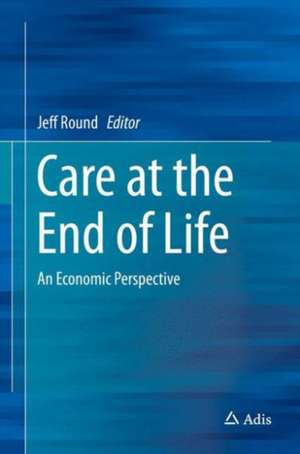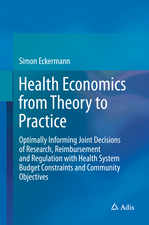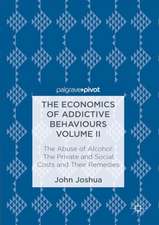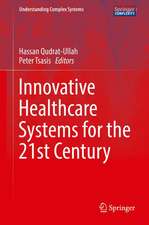Care at the End of Life: An Economic Perspective
Editat de Jeff Rounden Limba Engleză Hardback – 8 mar 2016
The provision of care to individuals with disorders associated with advancing age, such as cancer and dementia, is an increasing concern amongst policy makers and providers of health and social care. Accordingly, the burden on state and private funders in providing care to patients with these complex illnesses is of growing importance to health economists. However, answering the questions raised by the research community on end of life and palliative care health economics has received little attention. The authors shed light on many questions including: Are economic evaluation methods fit for purpose in patients at the end of life? What is the best way to measure and value health outcomes in this population? What are the appropriate societal rules to govern resource allocation for people at the end of life? Are these people more or less deserving of resources than other patients? Does age matter? How can we define a good death for the purposes of resource allocation decision making? What ethics govern research in end of life patients?
| Toate formatele și edițiile | Preț | Express |
|---|---|---|
| Paperback (1) | 351.27 lei 39-44 zile | |
| Springer International Publishing – 7 apr 2018 | 351.27 lei 39-44 zile | |
| Hardback (1) | 404.13 lei 3-5 săpt. | |
| Springer International Publishing – 8 mar 2016 | 404.13 lei 3-5 săpt. |
Preț: 404.13 lei
Nou
Puncte Express: 606
Preț estimativ în valută:
77.33€ • 82.69$ • 64.48£
77.33€ • 82.69$ • 64.48£
Carte disponibilă
Livrare economică 27 martie-10 aprilie
Preluare comenzi: 021 569.72.76
Specificații
ISBN-13: 9783319282664
ISBN-10: 3319282662
Pagini: 212
Ilustrații: XIII, 205 p. 17 illus., 11 illus. in color.
Dimensiuni: 155 x 235 x 15 mm
Greutate: 0.79 kg
Ediția:1st ed. 2016
Editura: Springer International Publishing
Colecția Adis
Locul publicării:Cham, Switzerland
ISBN-10: 3319282662
Pagini: 212
Ilustrații: XIII, 205 p. 17 illus., 11 illus. in color.
Dimensiuni: 155 x 235 x 15 mm
Greutate: 0.79 kg
Ediția:1st ed. 2016
Editura: Springer International Publishing
Colecția Adis
Locul publicării:Cham, Switzerland
Public țintă
Professional/practitionerCuprins
Introduction.- Methodological challenges in researching patients at the end of life.- Measuring and valuing outcomes.- End of life care and society.
Notă biografică
Jeff Round is ahealth economist in the School of Social and Community Medicine at theUniversity of Bristol. From 2010, when he first joined the Marie CuriePalliative Care Research Unit at University College London, his primary researchinterests have been in the economics of end of life and palliative care. He haspublished on a range of topics relating to the economics of end of life care,including the costs of caring for people at the end of life, economicevaluations of complex interventions and the most appropriate methods for themeasurement and valuation of outcomes. He is also interested in the role ofinformal caregivers at the end of life, which is the focus of PhD research. Hiswork in this area is focused on the impact of care giving on the economic andlabour market outcomes of caregivers as well as on theirhealth and well being.
Textul de pe ultima copertă
This work carefully guides the reader through the methodological, policy and ethical challenges facing health economists conducting research in palliative care. It has collected the opinions of many cutting-edge researchers. Those who design and conduct economic evaluations or economics-related research in end of life populations will find this book thought provoking, instructive and informative.
The provision of care to individuals with disorders associated with advancing age, such as cancer and dementia, is an increasing concern amongst policy makers and providers of health and social care. Accordingly, the burden on state and private funders in providing care to patients with these complex illnesses is of growing importance to health economists. However, answering the questions raised by the research community on end of life and palliative care health economics has received little attention. The authors shed light on many questions including: Are economic evaluation methodsfit for purpose in patients at the end of life? What is the best way to measure and value health outcomes in this population? What are the appropriate societal rules to govern resource allocation for people at the end of life? Are these people more or less deserving of resources than other patients? Does age matter? How can we define a good death for the purposes of resource allocation decision making? What ethics govern research in end of life patients?
The provision of care to individuals with disorders associated with advancing age, such as cancer and dementia, is an increasing concern amongst policy makers and providers of health and social care. Accordingly, the burden on state and private funders in providing care to patients with these complex illnesses is of growing importance to health economists. However, answering the questions raised by the research community on end of life and palliative care health economics has received little attention. The authors shed light on many questions including: Are economic evaluation methodsfit for purpose in patients at the end of life? What is the best way to measure and value health outcomes in this population? What are the appropriate societal rules to govern resource allocation for people at the end of life? Are these people more or less deserving of resources than other patients? Does age matter? How can we define a good death for the purposes of resource allocation decision making? What ethics govern research in end of life patients?
Caracteristici
Multinational authorship provides the most current and authoritative thinking Provides practical guidance on overcoming methodological challenges? Equips readers to understand health policy and ethical issues Proposes novel approaches to measuring and valuing outcomes














